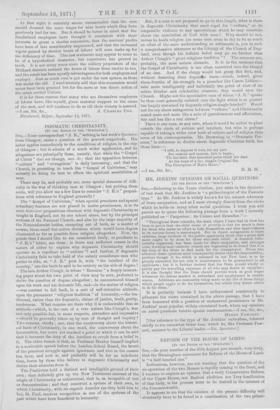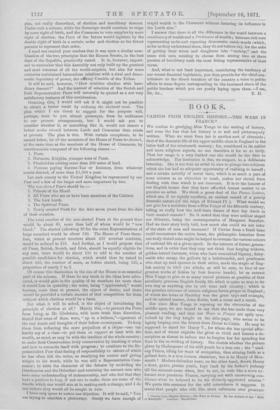REFORM OF THE HOUSE OF LORDS.
[TO THE EDITOR Or TILE "SPECTATOR:1 S1R,—In your number of the 25th August you remark, very truly, that the Birmingham movement for Reform of the House of Lords is "a half-hearted one."
Indications, however, are not wanting that the question of the co-operation of the two Houses is rapidly coming to the front, and I venture to express an opinion that a truly Conservative Reform of the Upper House, not Radical abolition nor Tory fossilization of that body, is the process most to be desired in the interest of the Commonwealth.
It appears to me that the solution of the present difficulty will eventually have to be found in a combination of the two prinei-
plea, not really discordant, of election and hereditary descent. Under such a scheme, while the Sovereign would continue to reign by mere right of birth, and the Commons to vote supplies by mere right of election, the Peers of the future would legislate by the double right of birth in a certain order and election as the fittest persons to represent that order.
I need not remind your readers that it was upon a similar com- bination of the two principles that the Roman Senate, in the beat days of the Republic, practically rested. It is, however, import- ant to remember that this Assembly not only built up the greatest and most coherent of all the world-empires, but also for some centuries maintained harmonious relations with a rival and demo- cratic depositary of power, the stEirmy Comitia of the Tribes.
It will be said, however, "How combine election with here- ditary descent?" And the manner of selection of the Scotch and Irish Representative Peers will naturally be quoted as a not very satisfactory instance of this combination.
Granting this, I would still ask if it might not be possible to obtain a better result by widening the electoral area. The plan which I am about to suggest for the purpose will, perhaps, seem to you almost grotesque, from its unlikeness to our present arrangements, but I would ask you to consider whether it, or something like it, would not ensure a better modus vixen& between Lords and Commons than exists at present. The plan is this. With certain exceptions, to be named below, let all the members of the House of Peers be elected, at the same time as the members of the House of Commons, by constituencies composed of the following classes :—
1. Peers.
2. Baronets, Knights, younger sons of Peers.
3. Freeholders owning more than 200 acres of land.
4. Persons paying Income-Tax or Incomes, from whatever source derived, of more than £1,000 a year.
Let each county in the United Kingdom be represented by one Peer and a few of the larger and more important by two. The non-elected Peers should be :—
1. Princes of the Blood.
2. All Peers who are or have been members of the Cabinet.
3. The Law Lords.
4. The Spiritual Peers, 0. Newly created Peas for the first seven years from the date of their creation.
The total number of the non-elected Peers at the present time would be about 80, more than half of whom would be "new blood." The elected (allowing 20 for the extra Representatives of large counties) would be about 130. The House of Peers there- fore, which at present numbers about 420 nominal members, would be reduced to 210. And further, as I would propose that all Peers, British, Scotch, and Irish, should be equally eligible for any seat, there would be about 100 to add to the number of possible candidates for election, which would thus be raised to about 440, the number of seats, as before stated, being 130, a proportion of nearly 7 to 2.
Of course this diminution in the size of the House is an essential part of the scheme. If there be any truth in the ideas here advo- cated, it would gain in the quality of its members far more than it would lose in quantity ; the seats, being "appreciated," would become, more than at present, the object of desire, and there would be provided a certain amount of that competition for them without which election would be a farce.
Bat what, it will be asked, is the object of iutroducing the principle of election at all? Mainly this,—to prevent the Peers from being, as Mr. Gladstone, with more truth than discretion, hinted that some of them were, " up in a balloon,"—ignorant of the real wants and thoughts of their fellow-countrymen. To keep them from reflecting the mere prejudices of a clique—one can hardly say of a class—to put them en rapport at least with the wealth, as much as may be with the intellect of the whole country; to make their Conservatism truly conservative by teaching it when and how to reconcile itself with progress ; to continue to the Re- presentative Peer that feeling of responsibility to others of which he has often felt the value, as steadying his course and giving weight to his words, while he was still a Representative Com- moner; to raise the character of the debates by excluding the Dundrearies and the Drivellers and retaining the earnest men who have some understanding of statesmanship, and who feel that they have a position to keep, if not one to make, these are some of the results which one would. aim at in making such a change, and.[ do not believe they would all be sought in vain.
I have only space to notice one objection. It will be said, "You are trying to establish a plutocracy. Surely we have enough of stupid wealth in the Commons without fostering its influence in the Lords also."
I answer that there is all the difference in the world between a constituency of wealth and a Parliantent of wealth ; between rich men representing mobs and repeating democratic catch-words (which, as far as they understand them, they do not believe in), for the sake of getting their wives and daughters into "society," and the same rich men meeting to choose from among two or three persons of hereditary rank the most fitting representative of their views.
And, what is not least important, considering the tendency of our recent financial legislation, you thus provide for the chief con- tributors to the direct taxation of the country a voice in public affairs in some degree corresponding to the increased share of the public burdens which you are yearly laying upon thein.—I am,































 Previous page
Previous page